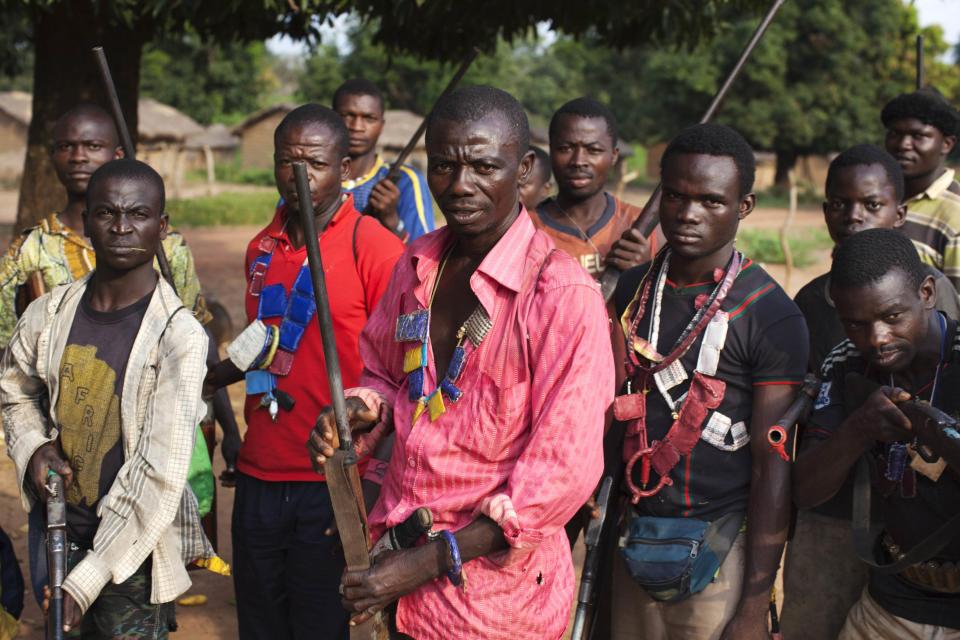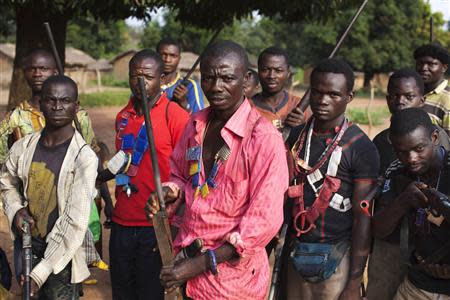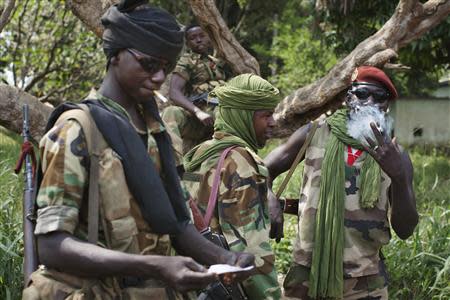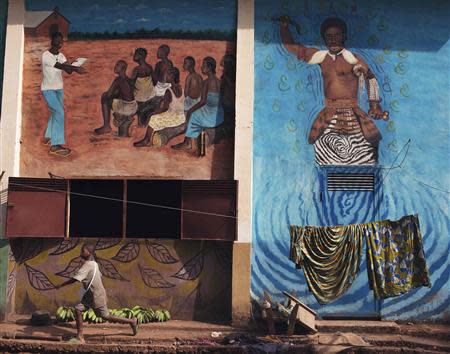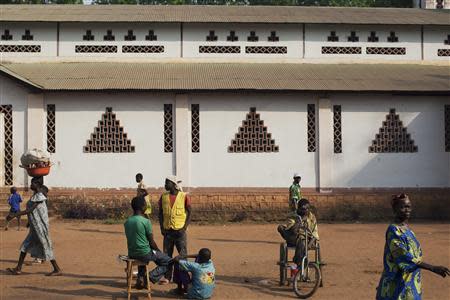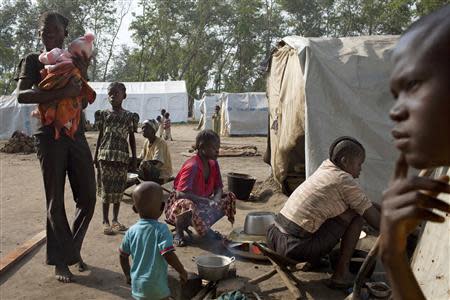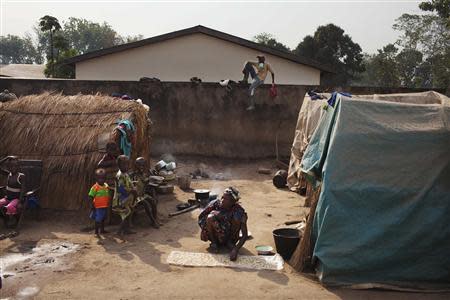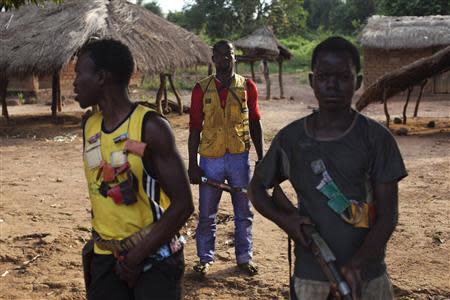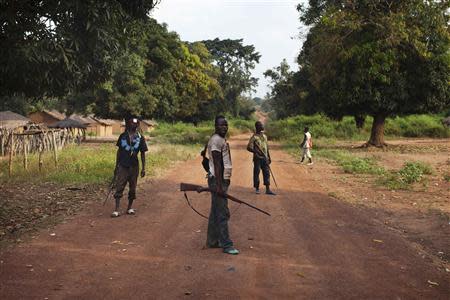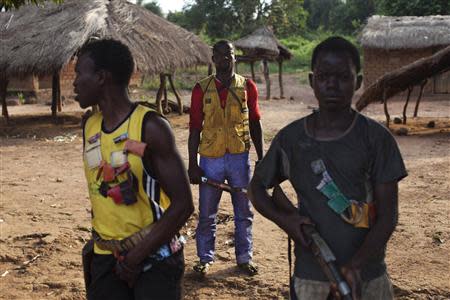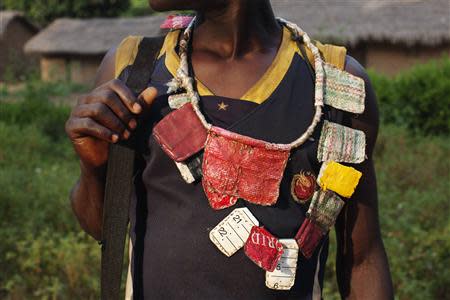Living in fear, Central African Republic awaits foreign intervention
By Joe Penney BOSSANGOA, Central African Republic (Reuters) - Mathieu Marco hid in his shower as the Muslim militia commander who came to kill him screamed at his young son, demanding to know where he was. Frustrated at his failure to find the man he took for a Christian fighter, he seized a 13-year-old neighbor on the street and shot him in front of the house. "He killed him in cold blood, just like that. Pow, Pow!" said Marco, a portrait photographer living now in the remote town of Bossangoa among 40,000 Christians displaced by sectarian violence now gripping the Central African Republic. Like others with tales of arbitrary violence to tell he sees salvation in foreign intervention. "French soldiers or Americans or Asians ... We just want peace," he said, anxiously listening to his radio at the entrance to the church grounds where the refugees have settled. Central African Republic, a nation of 4.6 million people at the heart of Africa, has been gripped by violence since mainly Muslim Seleka rebels, many of them fighters from neighboring Sudan and Chad, seized power in the majority Christian country in March. "Seleka are just professional bandits," said Marco. "They have come here to plunder our nation. They must be chased away, that's all." With the landlocked country sliding deeper into chaos, former colonial power France plans to boost its force there to around 1,000 troops to restore law and order until a larger African Union contingent fully deploys. Some 460,000 people, a tenth of the population, have fled the sectarian violence since the Seleka rebel coalition, a loose alliance of warlords, seized power. Fearing that tit-for-tat killings could escalate into full-blown war between religious communities and destabilize the entire region, world powers are scrambling into action. France, which has repeatedly intervened in Central African Republic since independence in 1960, stood by as the rebels marched south to topple President Francois Bozize, overruning a contingent of South African peacekeepers. France's 400 troops have protected the international airport and French assets. With a 2,500-strong regional African force unable to contain violence, France has been forced into action. However, details remain sketchy of how Paris hopes with 1,000 soldiers to impose order in a nation roughly the size of France. But news of French reinforcements, due to be approved by the U.N. Security Council as early as next week, has already spawned hope among many in the southern, riverside capital Bangui, which French soldiers will seek to stabilize first. "It has calmed people. We feel safe with the arrival of the French. It reassures us," said 30-year-old resident Mauricia, who stuck a French flag to a window of her car. "LIBERATE US" Outside Bangui, Seleka abuses have given rise to Christian militias known as "anti-balaka" - or anti-machete - and an endless cycle of attacks and reprisal killings. Danue Erephin, a 33-year-old farmer, was working in his field when he and his neighbors were seized by a group of 10 Seleka fighters, all of them Chadian he said. "They beat us, searched our homes and found money, and they yelled 'You are anti-balaka!' which we denied," he said. That night, they were thrown off a bridge with their wrists and ankles bound. Three of the seven survived. While Seleka's fighters have borne the bulk of the blame for the chaos, Muslim civilians, who represent just 15 percent of the population, say Seleka are their only protection from Christian militia that have formed in response the anti-balaka. "They've killed all the Muslims who were in the bush. If there was no Seleka, we would no longer exist," said Achille Sakairou, a 22-year-old driver from Bossangoa. Highlighting the cycles of violence, some 75 km south of the town, a group of two dozen men, armed with rusty rifles and adorned with mystical gris-gris talismans, stood guard. "If they try to enter our fields, we retaliate. This is legitimate self-defense," said Marto Simplice, head of the anti-balaka in Mbakate village. Although rich in diamonds, gold and uranium, Central African Republic has seen little but conflict and instability in five decades. Violence often spills over from neighbors' wars. But the scale of the current conflict is unprecedented. Seleka was formally disbanded in September by its leader Michel Djotodia, now interim president, in an effort to stem the widespread looting and killings they were accused of. However, they still dominate the streets of Bangui, bristling with machineguns and rocket launchers as they speed past patrolling French and African peacekeepers. In recent weeks, they are accused of killing two judges. U.N. Secretary-General Ban Ki-moon this month ordered his officials to start preparing for the likely deployment of a U.N. peacekeeping mission. But African leaders want to give the AU force time to try to stabilize the situation. French officials, meanwhile, have repeatedly played down comparisons with operations in Mali, another former colony where Paris has committed to keep troops after a massive military campaign to beat back al Qaeda-linked Islamists. Meanwhile, fear prevails. Even before an overnight curfew imposed last week, few in Bangui dared to venture onto the streets after sunset. "The people are in total despair. We hope this force will come to finally liberate us," said a businessman who gave his name as Gaspard. (Additional reporting by Emmanuel Braun; Writing by Joe Bavier; Editing by David Lewis and Ralph Boulton)
